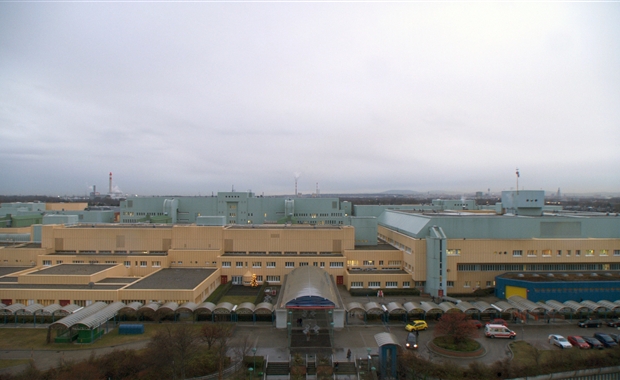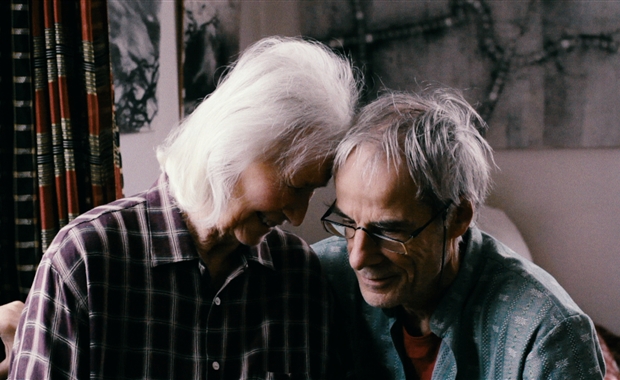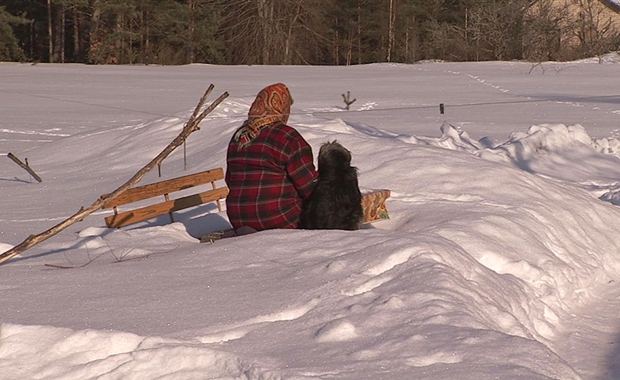Documentary film making is always a subjective exercise, despite occasional protestations to the contrary. Narrative belongs to the story-teller, in this case the film-maker; their perspective, their knowledge, their presence and engagement with their subjects, all these feed into the over-arching narrative arc that they hope to shape. Whether audiences ever did believe in the construct of documentary as fact is perhaps a moot question. The important thing now is that viewers have sophisticated expectations. How film-makers reflect on their role as a part of the film makes all the difference to the emotional and intellectual footprint that the finished product will leave, as three films showing at the ongoing Doc Aviv festival demonstrate in very different ways.

Danube Hospital takes a formal approach to the business: Director Nikolaus Geyrhalter is the fly on the wall, albeit a fly with no particular expectations about what may or may not occur during his watch. One very quickly forms the impression that he has set out to create the antithesis of the drama-driven institution familiar from television. The emphasis at Danube is on order and routine. Which, if one comes to think of it, is actually a reassuring conceit.
Geyrhalter’s camera is a detached presence, both emotionally and physically. He favours panoramic scenes to close ups, long static shots over tracking cameras. His principals oblige: their movements and pronouncements are very deliberate, subdued. Betwixt the two, a sterile and uniform aesthetic emerges. His access is comprehensive: he captures an autopsy, complex spinal surgery and a pathology conference, as well as a maintenance staff meeting, the hospital kitchens, and even the everyday business of sorting out difficulties in the parking lot. The overriding sensibility is one where passion is minimised by the need for procedure and predictability. The film, like many of its subjects, is laconic in tone but never disengaged. It is only in the last, lingering shot that the film-maker’s editorial intent seems to emerge. All that we see is merely part of a day’s work, and the quotidian ordinariness of it all is the guarantee of efficiency. Sometimes, the absence of drama is no bad thing at all.

Forget Me Not, by way of contrast, is underpinned by very personal considerations, family drama to wit. Gretel, the elderly mother of director David Sieveking, is subsiding into the painful twilight of Alzheimer’s disease. As her forgetfulness and emotional absence becomes more pronounced, so does the film-maker’s awareness of a part of her life that he had never known.
Gretel had been a journalist, husband Malte a professor of mathematics. Both were active in the progressive political activism of the late 1960s and early 70s, and were eventually forced to decamp from Germany to Switzerland to avoid political persecution. Both also embraced the progressive social politics of their milieu: they kept an open marriage and took lovers. Political convictions and personal preferences often make for awkward bed-fellows, one imagines. In their case, it prompts a crisis in their relationship: as Gretel’s lover puts it, when talking to Sieveking about Gretel’s untold past, “what is tolerable is not necessarily what is right.”
“My mother told me once that it is not romantic love that is permanent, but the love for the children that you share,” Sieveking muses. It is a particularly poignant insight, given that he was born after the crisis that his parents’ marriage weathered. It is also, in an oblique way, the undoing of a competent but at times uncommitted film. Sieveking seems uncertain about how to negotiate his role as both documentarian and participant. There is a powerful, painful story about the descent into intellectual decrepitude of a once intelligent and independent woman; there is also a very personal reflection about the woman who was once his mother, and what she was before she became this. The two narrative tracks never satisfactorily merge, and what emerges between the two is a story that is undoubtedly moving and heartfelt, but at times does the director no favours. It is somewhat voyeuristic, one must admit, to insist that he insert himself emotionally on screen. But it is his story as much as his mother’s, and he has chosen to share it.

The Documentarian, on the other hand, does not suffer at all from the falterings formed from diffidence. Inta, the subject of the documentary, lives in a shack somewhere in rural Latvia, and possesses a tongue to match her rudimentary surroundings. “You fucking offspring of a bitch, grinning faggot. Didn’t they fuck you in the arse properly?” are the words with which she greets our intrepid film-maker. She is garrulous, cantankerous, and from a salacious point of view the perfect subject for an observatory documentary.
The Documentarian – directed by Inese Klava and Ivers Zviedris (the latter the recipient of the afore-mentioned opprobrium) – is a troubling film for a number of reasons, not least that of the role of the documentarian as a protagonist. Zviedris’ motivation for making a film about Inga is that she is a curious character: so he proceeds to inveigle himself into her life, using patience and persuasion.
The line that divides between curious exploration and crass exploitation is not always the clearest in documentary film making. Zviedris, it must be said to his credit, maintains a patient and genuinely interested presence in Inta’s life. With time she thaws, proving his instincts right. She is sometimes coquettish, more often blunt and forthright. Once, she asks him what the point is in wasting so much film on her. It is Art, he replies. For fucks sake, she snorts derisively. Bit by bit, disconnected fragments (perhaps not so disconnected) from her life unfurl. She loathes her mother. She once ran an illegal pharmacy. It is an intriguing, incomplete portrait, and despite her rough edges once cannot but begin to feel tenderly towards Inta.
But the problem with interjecting one’s presence into another life artificially – and if we accept that documentary film making is subjective, we must also concede that on some level it is also an artifice – is that extricating oneself can be complicated. Inta strikes the nail on the head. “If you create conflict situations…then this is not life,” she points out. She warms to the filmmaker, even as her disdain for his craft increases. The conflict that eventually punctuates the film is not of his making (at least deliberately), true; but it was always going to be there, and strikes an ethically duff note. “You might be a shithead, but there is something human about you,” Inga tells him. And then she retreats into her carapace once more. It’s a sour note to end the film on. One gives the filmmaker the benefit of the doubt, and assumes that he merely failed to mediate his presence in his own story adequately. The alternative really doesn’t bear thinking about.
Danube Hospital, Forget Me Not and The Documentarian are all showing in the International Competition of DocAviv, the Tel Aviv International Documentary Film Festival. Screening dates and times at www.docaviv.co.il
Danube Hospital directed by Nikoas Geythalter (75 min, German with Hebrew and English subtitles); Forget Me Not directed by David Sieveking (88 min, German with Hebrew and English subtitles); Documentariam, directed by Ivars Zviedris and Inses Klave (82 min, Latvian with Hebrew and English subtitles)





